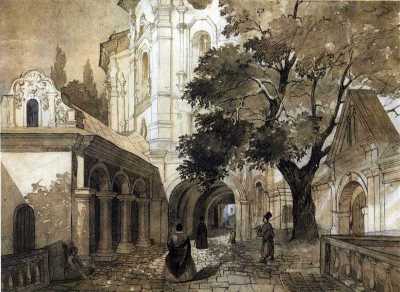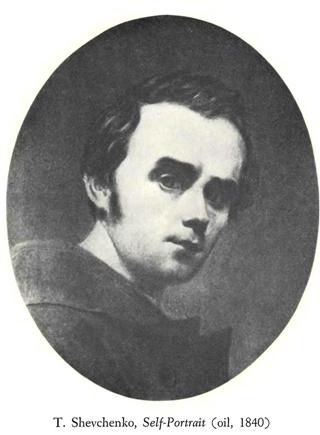TARAS SHEVCHENKO’S LIFE AND WORK
A story of Taras Shevchenko's life. Arrest.
(a part of introduction in English to "The Kobzar", 1964, by Constantine H. Andrusyshen)
(Introduction of "The poetical works of Taras Shevchenko. The Kobzar" by Constantine Henry Andrusyshen and Watson Kirkconnell)

Taras Shevchenko.
"All Saints church in Kyiv-Pechersk lavra"Towards the end of January 1847, Petro Kulish married Oleksandra Bilozerska, a budding writer and a leader of the feminist movement in Ukraine. The event took place at Kulish's manor in the village of Motronivka, and was the more festive as Shevchenko was there in the capacity of the chief attendant to the bridegroom. The bride was so taken up with him as a poet, artist, and singer that she decided to offer her entire dowry of 3,000 rubles to enable him to continue his studies in Italy. The matter was arranged and the poet was overjoyed at the opportunity. The journey, however, was postponed on account of his previous commitments, and the next two months he spent in excursions connected with his current work, in the leisurely intervals of which he continued to write, sketch, paint, and associate with the rural element in order to study their manners and customs at close hand. In the first days of April that year he started out for Kiev where again he was to act as best man, this time at Kostomarivs wedding. The latter in the meantime had been appointed professor of history at the University of Kiev, while Shevchenko was nominated as an instructor of painting for a period of one year at the same institution. All that, however, was upset by the sudden arrest of all the members of the Brotherhood.
Shevchenko was arrested on the Kiev bank of the Dnieper (on April 5, 1847) as he stepped down on dry land from a ferry. In his baggage the police found, in addition to paintings and sketches, a number of personal letters considered subversive in character and, above all, a copy of the manuscript “The Three Years,” containing the already mentioned illegal and incriminatory poems. All this evidence was sent to St. Petersburg. After spending one night in a Kiev prison, Shevchenko was transported under police escort to the Russian capital, which he reached eleven days later. His comrades in the accusation had been imprisoned there several days earlier, Kulish having been arrested while actually on his way abroad to continue his studies in preparation for a professorship.
The provocateur Petrov, who had insinuated himself into V. Hulak's confidence by posing as a republican, and to whom the latter had read Shevchenko's poems (among them “The Dream” and “My Friendly Epistle”), in his denunciation to the authorities, pointed out that Shevchenko not only ridiculed the majesty of the imperial family but sought to incite his people to rebel against the established political order. During the search of Kostomarivs and Bilozersky's quarters, two weeks before the arrest, the police found those inflammatory verses, and no further proof was needed of Shevchenko's influence on the activities of the Brotherhood.
During the interrogation Shevchenko conducted himself both warily and nobly, yet somewhat humbly when he admitted to his interlocutors that he did commit a faux fas in deriding the tsarist family, particularly the Empress who, it may be remembered, had bought Briullov's portrait of Zhukovsky, thus contributing to his emancipation. He further declared that even if he did express himself injuriously with regard to the imperialist policies of the tsarist regime, he was merely repeating similar views heard among the Russians themselves in the very capital. To blunt the edge of the accusation that he was inciting his people to rebellion, he attributed his rather radical utterances to his revulsion against the oppression of the peasant masses by their landlords and the official overseers who persecuted them in the name of the Tsar. Concerning the Brotherhood, Shevchenko maintained that he never belonged to it (which was true) and that his archaeological excursions did not permit him to attend its meetings, as a result of which he was not too familiar with its aims. To attenuate the impression that its members were unduly influenced by his writings, he sought to convince the authorities (lamely enough, it must be admitted) that his poems were read in the Brotherhood's circle as a matter of curiosity, for the mere reason that they were written in Ukrainian.
For three weeks after this interrogation Shevchenko was left in peace. Together with his other fellow-prisoners he was treated well, even to the extent of being supplied with cream for tea, cigarettes, and cognac. His lack of reading matter and his solitary confinement, however, were difficult to bear, although each man was lodged in a clean cell and supplied with a Bible.
In the citadel where he was imprisoned, Shevchenko wrote thirteen short poems. Among them the most poignant was “To N. I. Kostomariv," composed after Shevchenko had seen, from behind a grated window, the historian's utterly dejected mother approaching the prison to visit her son; and the greatest was that which begins with the line “It is all one to me," and in which he expressed his unconcern as to what would happen to him, but keen anxiety at the very thought that Ukraine might be brought to utter ruin by her enemies.
Introduction written by Professor C.H. Andrusyshen
Source: The Poetical Works of Taras Shevchenko. The Kobzar. Translated from the Ukrainian by С. H. Andrusyshen and Watson Kirkconnell. Published for the Ukrainian Canadian Committee by University of Toronto Press, 1964. Toronto and Buffalo. Printed in Canada, Reprinted, 1977, p. 23 - 25.
Read more:

Introduction of "The poetical works of Taras Shevchenko. The Kobzar" by Constantine Henry Andrusyshen and Watson Kirkconnell.

